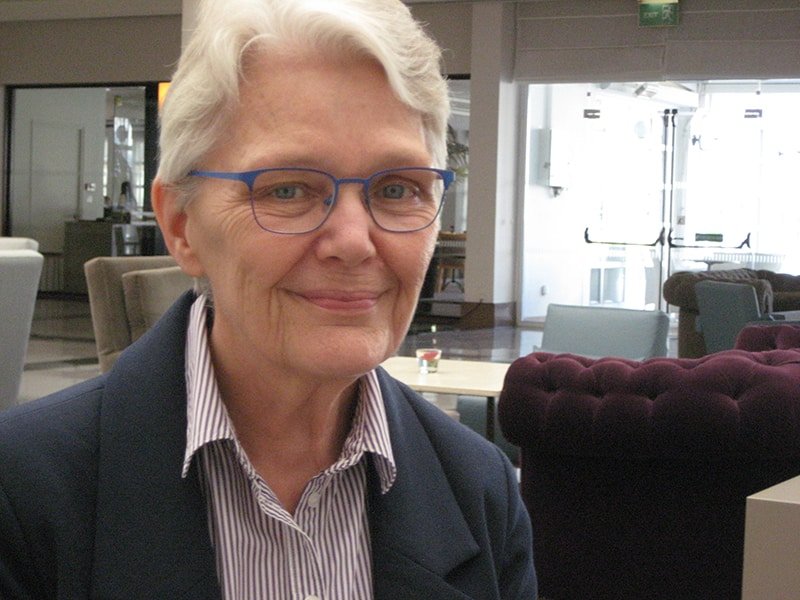
THEO PANAYIDES meets a globalised technocrat who has managed to stay calm despite taking on a number of roles around the world in the aftermath of atrocities
Margareta Wahlström shouldn’t be confused with Margot Wallström, even though both are high-powered Swedish women of a similar age. Ms Wallström is the Swedish foreign minister; Ms Wahlström – who was briefly in Cyprus last week, as the keynote speaker at a ‘Wikipedia edit-a-thon’ on International Women’s Day – is a prominent diplomat, former UN Special Representative, and current president of the Swedish Red Cross.
Despite spelling their surnames differently, the two women are sometimes confused, she tells me. When Margot became foreign minister she, Margareta, received congratulatory texts from all over the world. Then there was the time, during her days at the UN, when she was given a nice gift (a book) which – as became apparent while the presenter was making his speech – was actually intended for Margot, or probably the man just mixed them up. “The guy said, ‘Oh, I remember when you were the European Commissioner for the Environment, fantastic work’,” recalls Margareta, chuckling dryly. “I said [to myself], I will not tell him, I’ll just take the book. What’s the point of disappointing him?”
Two observations might be made about that story. The first relates to her personal style, which is indeed rather low-key and soft-spoken. One could easily imagine her staying silent through such a mix-up, her dry, almost soundless chuckle – which recurs often throughout our conversation – being the only trace of some private mirth. The second observation is more speculative: Wahlström and Wallström are completely different people, of course – yet it’s not entirely absurd that they should be conflated. Both women belong to that generation which was shaped by the Vietnam war and the events of 1968. They undoubtedly have values in common, and would surely see eye-to-eye on many things. Above all, both are part of a globalist, social-democratic elite, working proactively to change the world, with an emphasis on NGOs and supra-national organisations.
Margareta’s own vehicles were the International Red Cross and the United Nations, the latter for six years (2009-15) when she lived in New York and headed UNISDR, the United Nations’ Office for Disaster Risk Reduction (its aim was to persuade the world of “the need to manage and reduce risk”, rather than pay for the damage caused by natural disasters) – though her first real job was also UN-related, in Cambodia just after the fall of the Khmer Rouge. She was in her early 30s (she’ll be 68 in a couple of weeks), working in Vietnam at the time, and joined a small UNHCR team travelling around Cambodia trying to determine if conditions were ripe for a major repatriation of refugees from the Thai border. The country was “dazed”, she recalls, numbed by the horrors it had witnessed; people were traumatised. She sat and listened, a young woman from the small town of Boden in the far north of Sweden, offering only the promise of a kinder, more stable world.
That’s a fact to keep in mind, as she sits across from me in the breakfast room of the Hilton Park in Nicosia (we meet ‘over breakfast’, due to her hectic schedule, though we both end up foregoing actual food): much of Margareta’s work has been palliative and advisory – to help, to counsel, to listen. She’s seen a lot, but mostly the aftermath of atrocities rather than atrocities themselves. After Cambodia, she spent time in Angola, leading an orthopaedic workshop supplying artificial limbs to amputees from the civil war: “All these young men without arms and legs, and no future”. Later, from 2002-04, she was in Afghanistan, working on the “state-building exercise” which the West attempted (without much success) after 9/11. Her job, at all times, has been to fix obvious problems and try to suggest a better way – not as a local actor, but a studiously impartial technocrat.
Her energy doesn’t seem pushy. She sits across the table, Nordic-blue eyes gazing out from behind blue-rimmed glasses; her expression is a little anxious, her body language tentative. I explain that a profile may include some personal questions, prompting a wary “Hmm…” She does seem like a very calm person, I note. Is that accurate?
“It’s true, yes.”
Does she not get emotional? Especially doing what she does?
“Ja, I can get emotional, but probably not that often. Except about kids and animals.” The dry chuckle again. “Because they need protection and defence by adults. But I’m calm, and even when I get angry – or upset – I have been told that I get upset in a calm way.”
One must always be calm, in her line of work. Getting angry would only cause offence, and jeopardise a project. There’s also the issue that the work is, to some extent, inherently frustrating. The toughest thing about Angola, she recalls, wasn’t the depressing daily spectacle of limbless, hopeless people (some of them children), it was making sense of her own role: “You become like – I was going to say a king, but maybe I should say a queen. You become like the central person upon which they place a lot of their hope, particularly in the beginning… But some of these guys – no arms, no legs…” Margareta shakes her head: “You don’t have that much to offer”. The only recourse is to stay calm and focus on specifics, whatever can be done to make their lives a little better. “I cannot judge if their life is good enough or not. That’s for them to judge.”
Did she bond with the amputees? Did they become friends?
A pause. “Ye-e-es,” she replies tentatively. “It’s mostly work, you know. But you are friends in the time you are there.”

taking part in the Fiacolatta walk as president of the Swedish red cross
Thereby hangs a tale – because her calmness is also a distance, and distance is perceptible in Margareta Wahlström’s makeup. At one point I ask if the work ever got lonely – always an outsider, moving from project to project – and elicit another long pause. “It depends on your personality,” she replies at last. “But I am the type of person who needs to be lonely, at least every now and then!”
She is, after all, a lifelong technocrat in the age of globalisation; ‘going local’ would only impede her ability to do her work. It’s not that she doesn’t care where she lives; she resisted living in New York, for instance, her small-town childhood making her suspicious of big cities. But it’s also true that she hasn’t lived in Sweden for 30 years, and has no home base as such – just a flat in Stockholm which she mostly treats as a storeroom for the papers and other detritus from her various assignments (“It’s like archaeological layers of my life,” she explains with another dry chuckle). People like her – diplomats, do-gooders, call them what you will – have their own way of life. Her friends are mostly from the same milieu, plucked from all over the world – and of course the hours are brutal, not so much these days (she’s semi-retired) but certainly in the past, when 80-hour weeks were quite common. It doesn’t leave much time for a personal life, I point out.
“Well, that becomes your life,” agrees Margareta. “Yeah, I don’t have any dog or cat, or whatever. You can’t have that if you travel all the time, and you don’t have a family to leave the dog to.”
Was she ever married?
“I was,” she replies, looking slightly abashed, “but – it didn’t work.”
Because of her work?
“Probably, yes.”
How long did it last?
“Five years.” She smiles, rather tightly: “I tried.”
Has she come close in the years since? Has she had any serious relationships?
She looks a bit startled, then gives me a deadpan look. “I am always serious,” she replies, and chuckles again.
It’s true, she is quite serious. There are no outside passions, no mindless hours in front of the telly (“I’m a bit impatient these days”), nor any vices to speak of. “Actually, I don’t know if you call it a vice, but I can offer it to you: I like crime novels and thrillers, and science fiction,” she replies at last, noting my surprise that she doesn’t have a way to let off steam, given how intense her life used to be. (Sorry, we couldn’t really call that a vice.) “How do I have fun? I take a very long walk in the forest! That’s what we do,” laughs Margareta, leaving it unclear if ‘we’ are globalised technocrats or Swedes in general.
Her secret, I suspect, is that she doesn’t dwell; not on people or places, and certainly not on the past. Does she regret not having kids, for instance? – but she shakes her head: “Maybe that’s my characteristic, that I don’t regret. I just try to change the future… Otherwise you spend a lot of time mulling over tiny things”. There was always something forthright, forward-looking, even reckless about her. “If an opportunity comes my way, I say ‘That’s interesting’ and I go for it”. Even before university, the girl from Boden spent a gap year in Patagonia (!) as tutor to the child of a Swedish family; later on, she upped and moved to Vietnam, working on the post-war rebuilding project. Throughout her life, despite her low-key style – or precisely because of it – she’s just ‘gone for it’, gotten on with things. What about being a woman in the 70s? Did she ever suffer discrimination? “Probably did,” she replies airily. “But I didn’t realise until I started thinking about it, frankly.”
That’s a whole new discussion, of course, gender equality being the buzzword du jour and directly related to what she’s doing in Cyprus. The ‘Wikipedia edit-a-thon’ was one of 50 such events taking place in parallel in various countries, aimed at redressing the gender imbalance on Wikipedia by writing articles on women. Sweden is officially committed to a ‘feminist foreign policy’ (overseen by her alter ego, Margot Wallström!) and Margareta is happy to help. She’s now past the age of retirement, but has no plans to retire – what would she do with herself? – so instead “what I’m doing, which is full-time, are lots of things which are remunerated, but not as employment”.
Feminism was never really ‘her’ cause, she admits (she always had “a rather straightforward perspective on the opportunities [for women]”, probably meaning that she got on with life and didn’t stop to think about the obstacles), but she’s been paying more attention in recent years – and gives me a fair-minded overview of the problem, including the kind of complex questions you’d expect from a lifelong administrator: “Are women different managers than men?” “Do women always want to be in those [managerial] positions?”. Women’s rights have always been on the agenda, of course: 15 years ago in Afghanistan, the new modern state being built by the West didn’t just give women the vote but reserved 25 per cent of parliamentary seats for them. Alas, it soon became clear – or maybe there wasn’t the political will to prevent it? – that a new constitution wouldn’t be enough to silence the guns of the Taliban. The law changed; society didn’t.
That’s the way it goes in the real world. Life unravels, people are weak. Afghan women remain oppressed, Cambodia’s ghosts remain un-exorcised. Those crippled war vets in Angola never did get back to their old lives, in all probability, despite being fitted with artificial limbs. Margareta Wahlström isn’t sentimental, nor especially optimistic (she thinks we’re moving far too slowly to prevent climate change, for one thing); maybe it’s age – but I reckon she was never the starry-eyed activist, even as a younger woman. There’s a chill to her, despite the dry chuckle.
“I just try to change the future, I can’t change the past,” she explains sensibly. The past isn’t just a foreign country, it’s something of a failed state: even when we learn from it, she says – which is by no means every time – the vast majority of those lessons are ignored or forgotten. Instead she inches forward one project, one cause, one concerted effort to help at a time, on the basis that action is better than inaction, reducing risk (as in her recent UN job) better than dealing with the fallout, and being present – for as long as she has the energy – better than throwing in the towel. She’s even relished the politics, of member states and trying to build consensus. “For me it’s been extremely rewarding, and it’s given me many times that sense of optimism that you’re asking for, when I worked with countries in the UN.” Give this woman a foreign ministry, or something.
The post Working to change the world appeared first on Cyprus Mail.
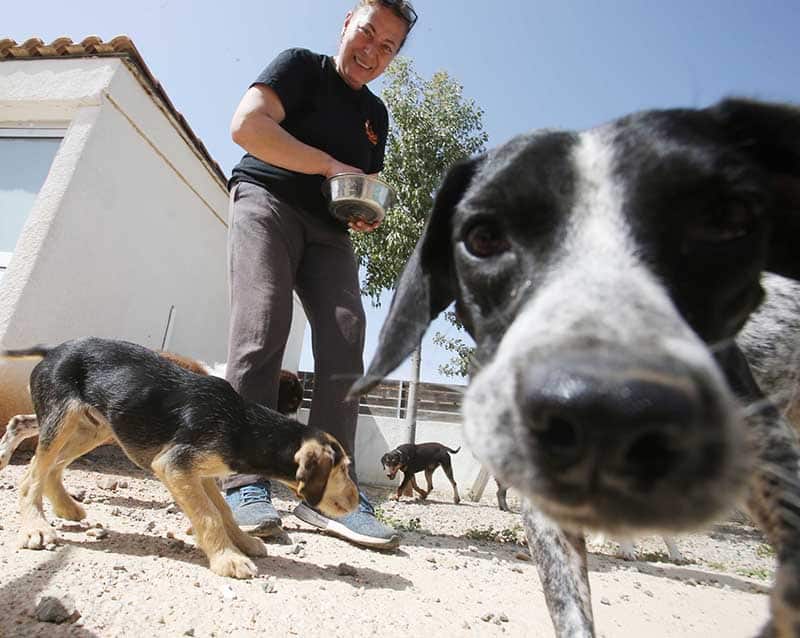
 All this serves as preface to her current chapter, and may go some way towards ‘explaining’ her. She’s always been a bit unconventional. She’s always – despite her bubbly, extrovert nature – been a little withdrawn. She’s always stood up for animals. When Shakespeare and Co. turned out to be females (with kittens), her angry mother issued an ultimatum: “Either those cats go, or you go!”. The teen’s response was to stalk out, cats in tow, and move to the carob tree at the bottom of the garden, refusing to come down till her mum (who’d come after her with a broomstick) relented, and allowed her to keep the kittens.
All this serves as preface to her current chapter, and may go some way towards ‘explaining’ her. She’s always been a bit unconventional. She’s always – despite her bubbly, extrovert nature – been a little withdrawn. She’s always stood up for animals. When Shakespeare and Co. turned out to be females (with kittens), her angry mother issued an ultimatum: “Either those cats go, or you go!”. The teen’s response was to stalk out, cats in tow, and move to the carob tree at the bottom of the garden, refusing to come down till her mum (who’d come after her with a broomstick) relented, and allowed her to keep the kittens.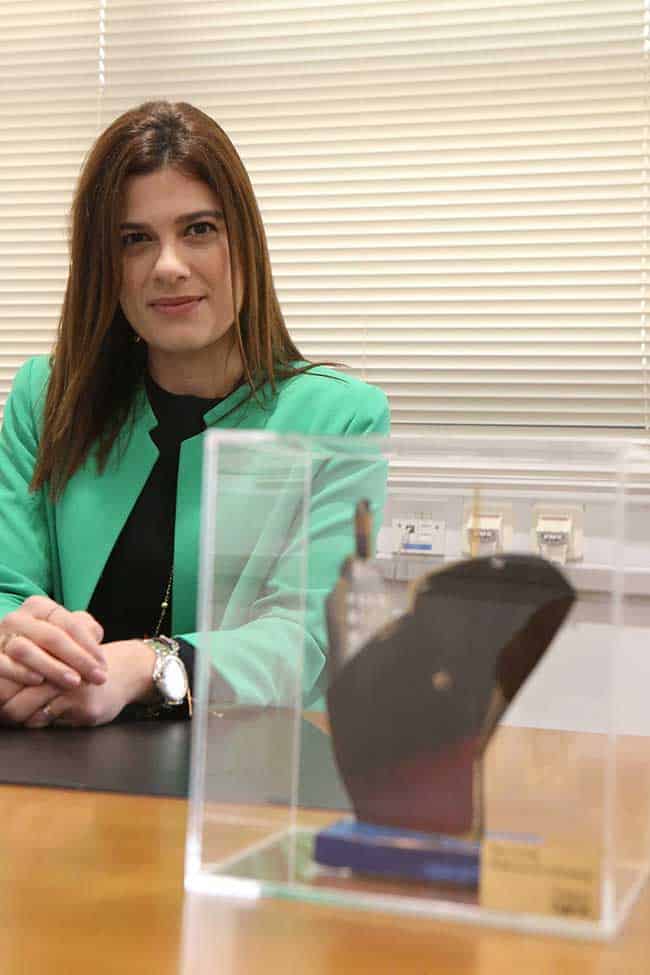




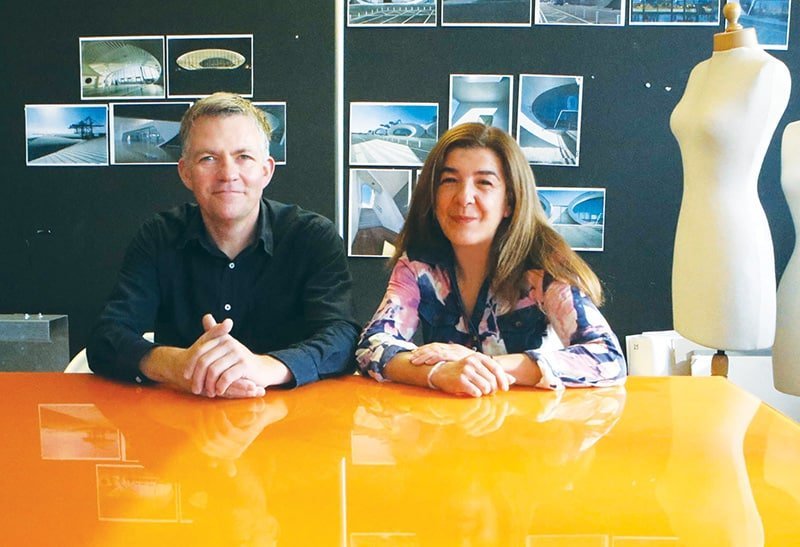
 “We still do that,” points out Margarita.
“We still do that,” points out Margarita.


 His sport isn’t just a sport: it’s the anchor in his turbulent life, the one blessed constant in a shifting emotional landscape. Marios has been with the same coach since he was five years old, and has had money coming in from sponsors (mostly OPAP) and government schemes since the Olympics. With the exception of a rebel phase in his mid-teens, when he dropped out for a few months and fell in with a bad crowd – they hung out, smoked a lot and “pretended to be gangsters”; he did backflips to entertain his new friends, and felt a pang in his heart for gymnastics – he’s been doing this all his life, training every day except Sunday, eating five boiled eggs for breakfast then spending six hours (two in the morning, four in the afternoon) swivelling and balancing and exerting total control over his body.
His sport isn’t just a sport: it’s the anchor in his turbulent life, the one blessed constant in a shifting emotional landscape. Marios has been with the same coach since he was five years old, and has had money coming in from sponsors (mostly OPAP) and government schemes since the Olympics. With the exception of a rebel phase in his mid-teens, when he dropped out for a few months and fell in with a bad crowd – they hung out, smoked a lot and “pretended to be gangsters”; he did backflips to entertain his new friends, and felt a pang in his heart for gymnastics – he’s been doing this all his life, training every day except Sunday, eating five boiled eggs for breakfast then spending six hours (two in the morning, four in the afternoon) swivelling and balancing and exerting total control over his body.



 He would always have been drawn to the game, believes Michael, would always have enjoyed watching on TV and maybe playing for fun – but his success as a player wasn’t down to any natural genius, it was down to practical factors. The fact, for instance, that a family friend was a former pro, and taught him some rudimentary technique, or the fact that his parents – working-class, British-born Cypriots – encouraged their son’s obsession with snooker, and accompanied him to snooker halls which were “intimidating places” in those days. Practice makes perfect and the boy practised hard, working his way up the junior circuit; he finished at No. 2 in the UK, at a time when the standard was especially high (enfant terrible Judd Trump is his contemporary) – then, at the age of 19, won the World Under-21 Snooker Championship, making him the world’s top junior player (at least in theory) and gaining him entry to the professional tour. Three years later he left abruptly, being unable to make ends meet just from snooker. “When I quit, I thought that was it,” he recalls. “Because I was having such a bad year, and I was being put off the game so much. But I didn’t know back then what I know now.”
He would always have been drawn to the game, believes Michael, would always have enjoyed watching on TV and maybe playing for fun – but his success as a player wasn’t down to any natural genius, it was down to practical factors. The fact, for instance, that a family friend was a former pro, and taught him some rudimentary technique, or the fact that his parents – working-class, British-born Cypriots – encouraged their son’s obsession with snooker, and accompanied him to snooker halls which were “intimidating places” in those days. Practice makes perfect and the boy practised hard, working his way up the junior circuit; he finished at No. 2 in the UK, at a time when the standard was especially high (enfant terrible Judd Trump is his contemporary) – then, at the age of 19, won the World Under-21 Snooker Championship, making him the world’s top junior player (at least in theory) and gaining him entry to the professional tour. Three years later he left abruptly, being unable to make ends meet just from snooker. “When I quit, I thought that was it,” he recalls. “Because I was having such a bad year, and I was being put off the game so much. But I didn’t know back then what I know now.”
 And did he focus on any one particular aspect of cooking? Was he training as a patissier, a saucier, a poissonier or a rotisseur? His answer is a firm and dismissive no. He explains with the patience of the professional addressing a novice: “In a restaurant of this level, you don’t do any dishes by yourself. You are part of a team, minimally 12 in number, sometimes as many as 20 or 40. Whatever you work on, it is only a part of a dish, which, before it is ready, will have passed through the hands of at least eight people.”
And did he focus on any one particular aspect of cooking? Was he training as a patissier, a saucier, a poissonier or a rotisseur? His answer is a firm and dismissive no. He explains with the patience of the professional addressing a novice: “In a restaurant of this level, you don’t do any dishes by yourself. You are part of a team, minimally 12 in number, sometimes as many as 20 or 40. Whatever you work on, it is only a part of a dish, which, before it is ready, will have passed through the hands of at least eight people.”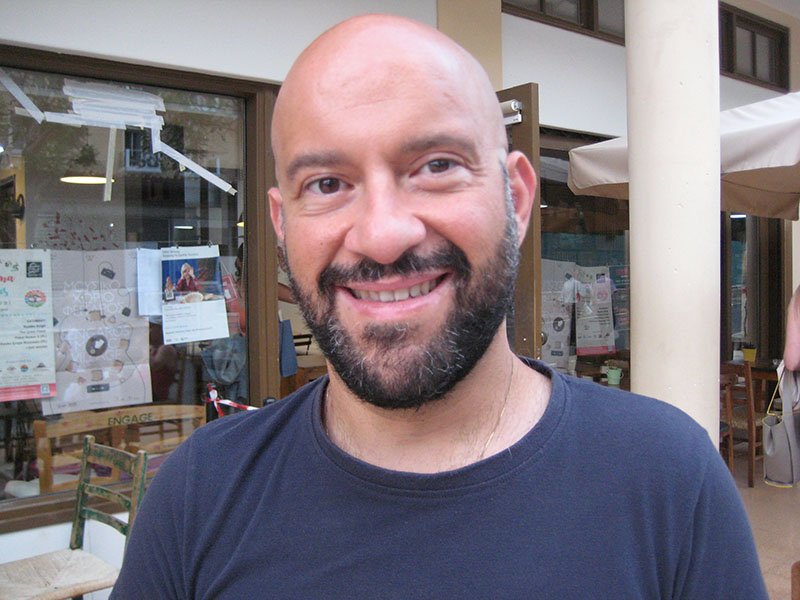


 All that said, it’s quite possible that Umberto isn’t the easiest person to live with. He has a temper, and does explode on occasion (“I’m generally very calm – but, if there’s something wrong, I shout”), but the larger issue is that no-one could’ve lived the life he’s lived without being unusually strong-willed; I assume he likes things to be the way he likes them. His wife can’t have been thrilled by his constant departures to far-off places – though it seems she also does her own thing, having now retired from Alitalia and gone off to work at her father’s pharmacy in Palermo without any immediate plans to join him in Cyprus. Are they even together? “Oh yes!” he assures me. “Long-distance. But we have Skype!”
All that said, it’s quite possible that Umberto isn’t the easiest person to live with. He has a temper, and does explode on occasion (“I’m generally very calm – but, if there’s something wrong, I shout”), but the larger issue is that no-one could’ve lived the life he’s lived without being unusually strong-willed; I assume he likes things to be the way he likes them. His wife can’t have been thrilled by his constant departures to far-off places – though it seems she also does her own thing, having now retired from Alitalia and gone off to work at her father’s pharmacy in Palermo without any immediate plans to join him in Cyprus. Are they even together? “Oh yes!” he assures me. “Long-distance. But we have Skype!”
 Craig can do this, despite not being a professional cardsharp (he can also spin a ball better than most dealers; you pick up a lot after 40 years) – but his main weapon was always the numbers, indeed that’s how he first became suspicious of the scammers, “because I looked at the analytics and the game margins didn’t look right”. Craig is hard-nosed, and immune to casino myths. In a place where people believe that betting money on their son’s birthday will somehow invoke Lady Luck, this assertive, down-to-earth, even somewhat dour Scotsman is the last redoubt of rational thinking.
Craig can do this, despite not being a professional cardsharp (he can also spin a ball better than most dealers; you pick up a lot after 40 years) – but his main weapon was always the numbers, indeed that’s how he first became suspicious of the scammers, “because I looked at the analytics and the game margins didn’t look right”. Craig is hard-nosed, and immune to casino myths. In a place where people believe that betting money on their son’s birthday will somehow invoke Lady Luck, this assertive, down-to-earth, even somewhat dour Scotsman is the last redoubt of rational thinking.
 It all comes together in his life (and art) at the Kitium Art Residencies – a gloriously private life where few people even see him, let alone tell him what to do; an austere life, neither spacious nor especially comfortable but devoted to his work, like some mediaeval monk; a quiet life and a physical one, working with his hands all day. He takes care of the studio (which fetches a small monthly wage) and will also – unlike a mediaeval monk – teach the occasional workshop. ‘Quiet’ shouldn’t be confused with ‘misanthropic’: Peter has friends, and will often walk downtown for a chat or a bite to eat. He’s happy to talk if people “drift past” the studio, which they often do. Don’t forget he got along with builders and bikers for years – though it may be significant that he’s long since lost touch with his old biker pals, and has only been back in England once in the nine years since he left. He’s not, it seems, a very sentimental person.
It all comes together in his life (and art) at the Kitium Art Residencies – a gloriously private life where few people even see him, let alone tell him what to do; an austere life, neither spacious nor especially comfortable but devoted to his work, like some mediaeval monk; a quiet life and a physical one, working with his hands all day. He takes care of the studio (which fetches a small monthly wage) and will also – unlike a mediaeval monk – teach the occasional workshop. ‘Quiet’ shouldn’t be confused with ‘misanthropic’: Peter has friends, and will often walk downtown for a chat or a bite to eat. He’s happy to talk if people “drift past” the studio, which they often do. Don’t forget he got along with builders and bikers for years – though it may be significant that he’s long since lost touch with his old biker pals, and has only been back in England once in the nine years since he left. He’s not, it seems, a very sentimental person.
 Some may call that repression, others civic duty. Demetrios Pierides has done his bit, to be sure; he hasn’t just posed for photos with the elite, he’s been one of them. He’s chaired 28 companies and was on the Bank of Cyprus board for 13 years, till 2006. (“Of course, to be on the board of Bank of Cyprus was also a family tradition – because the bank was created by my grandfather, amongst others.”) He was instrumental in founding the bank’s Greek network, and still can’t comprehend why Cypriot banks in Greece were sold for such a pittance around the time of the haircut. He’s twice declined offers of a ministry, and fended off entreaties to follow his father as mayor of Larnaca.
Some may call that repression, others civic duty. Demetrios Pierides has done his bit, to be sure; he hasn’t just posed for photos with the elite, he’s been one of them. He’s chaired 28 companies and was on the Bank of Cyprus board for 13 years, till 2006. (“Of course, to be on the board of Bank of Cyprus was also a family tradition – because the bank was created by my grandfather, amongst others.”) He was instrumental in founding the bank’s Greek network, and still can’t comprehend why Cypriot banks in Greece were sold for such a pittance around the time of the haircut. He’s twice declined offers of a ministry, and fended off entreaties to follow his father as mayor of Larnaca.
 “No,” she replies in her slightly fractured English. “I wasn’t popular girl – but I wasn’t, like, outcast. I was normal girl. I studied very well, I was best in my class, and I always had a good sense of humour, so my jokes were popular. I always told everyone funny stories – and, starting from the age of 15, I started to tell them horror stories, and I became very popular. My classmates, they liked them and they asked for more. Vampires were in fashion, zombies were in fashion, ghosts were in fashion in beginning-of-90s Russia.”
“No,” she replies in her slightly fractured English. “I wasn’t popular girl – but I wasn’t, like, outcast. I was normal girl. I studied very well, I was best in my class, and I always had a good sense of humour, so my jokes were popular. I always told everyone funny stories – and, starting from the age of 15, I started to tell them horror stories, and I became very popular. My classmates, they liked them and they asked for more. Vampires were in fashion, zombies were in fashion, ghosts were in fashion in beginning-of-90s Russia.”
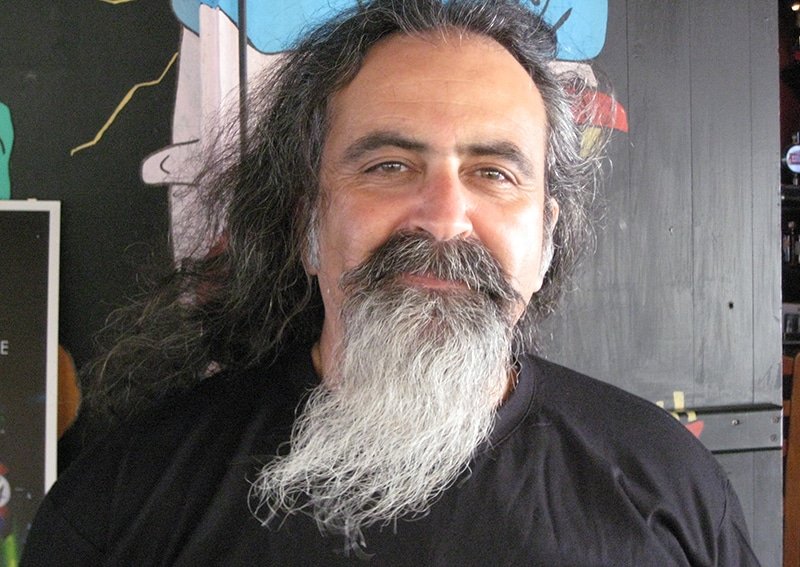
 That, incidentally, is par for the course: staff move on to ‘respectable’ jobs, just as customers go home every night and wake up for work in the morning. Only ‘Moulos’ (the Mule) stays on, his nickname – more than just a nickname; it’s how he’s universally known – having been bestowed by his brother years ago, when the brother was trying to ask him something and Christos was stubbornly ignoring him: “‘You’re a real Moulos,’ he told me, and the name stuck”. He opened the bar, with Mariann, in his 20s (he’s now 52) and has been there ever since, working late – he usually gets home around four – and operating on about five hours’ sleep. He’s not just the owner of Savino, he’s the custodian of the whole Savino Experience: an unchanging place, stubborn as Moulos himself, famously open 365 days a year. It only closed once, for four days in 1997, when a fire destroyed the bottles of booze and left the walls sooty; the regulars had nowhere to go, he recalls, and begged him to open anyway. “I don’t have any chairs,” he protested. “We don’t care!” they replied.
That, incidentally, is par for the course: staff move on to ‘respectable’ jobs, just as customers go home every night and wake up for work in the morning. Only ‘Moulos’ (the Mule) stays on, his nickname – more than just a nickname; it’s how he’s universally known – having been bestowed by his brother years ago, when the brother was trying to ask him something and Christos was stubbornly ignoring him: “‘You’re a real Moulos,’ he told me, and the name stuck”. He opened the bar, with Mariann, in his 20s (he’s now 52) and has been there ever since, working late – he usually gets home around four – and operating on about five hours’ sleep. He’s not just the owner of Savino, he’s the custodian of the whole Savino Experience: an unchanging place, stubborn as Moulos himself, famously open 365 days a year. It only closed once, for four days in 1997, when a fire destroyed the bottles of booze and left the walls sooty; the regulars had nowhere to go, he recalls, and begged him to open anyway. “I don’t have any chairs,” he protested. “We don’t care!” they replied.
 “People say Trinidad is the happiest place, the happiest people – which is true, to a point. It is not tense, at all,” goes on Kevin. “The texture of life is easy-going, maybe too easy-going. I think a lot of us are too easy-going – just kind of glidin’ through life, you know?” Yet the place is also slightly schizophrenic. Crime is a major problem; there were almost 500 murders last year. Kevin himself has witnessed a man being gunned down (it was a drive-by shooting; he happened to be driving behind the shooters’ car) and was mugged years ago though he managed to escape without being robbed, or worse. “I don’t like to normalise it – [but] I think almost everybody in Trinidad knows at least one person who’s been killed”.
“People say Trinidad is the happiest place, the happiest people – which is true, to a point. It is not tense, at all,” goes on Kevin. “The texture of life is easy-going, maybe too easy-going. I think a lot of us are too easy-going – just kind of glidin’ through life, you know?” Yet the place is also slightly schizophrenic. Crime is a major problem; there were almost 500 murders last year. Kevin himself has witnessed a man being gunned down (it was a drive-by shooting; he happened to be driving behind the shooters’ car) and was mugged years ago though he managed to escape without being robbed, or worse. “I don’t like to normalise it – [but] I think almost everybody in Trinidad knows at least one person who’s been killed”.